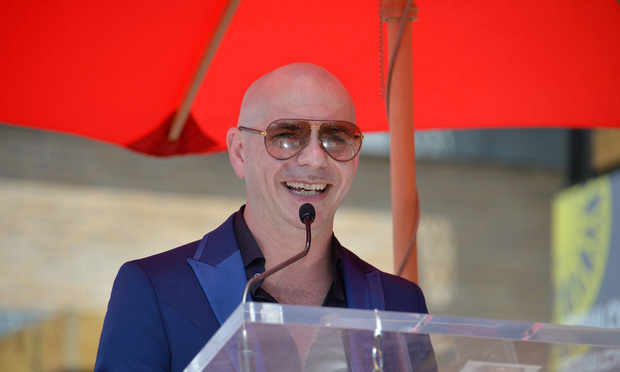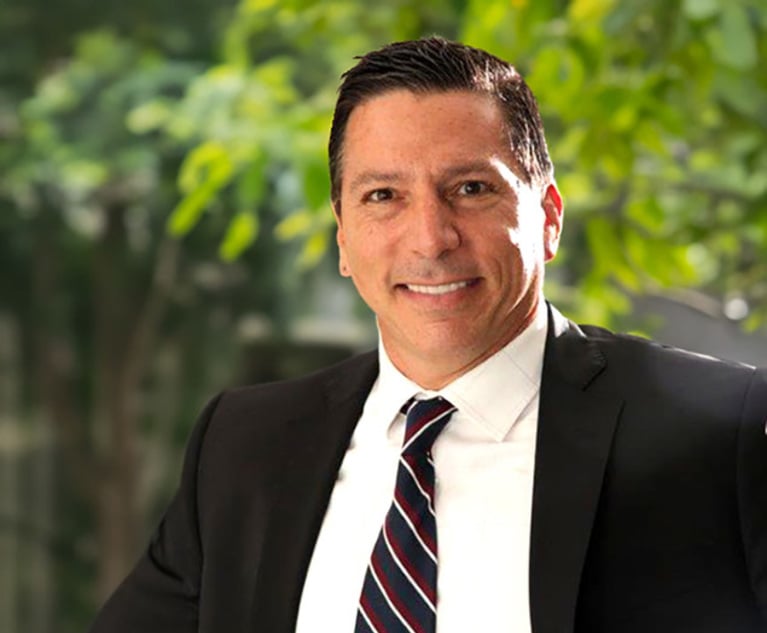'EEEEEEEYOOOOOO': Miami, Nashville Lawyers Worked 18 Months to Get Pitbull That Trademark
Pitbull joined an exclusive club of 36, with the likes of "60 Minutes," with its distinctive clock ticking, and MGM, with its powerful lion's roar.
April 24, 2020 at 11:00 AM
4 minute read
 Armando Christian Perez, the rapper known as Pitbull.
Armando Christian Perez, the rapper known as Pitbull.
It's an 'EEEEEEEYOOOOOO' that's been heard around the world.
And several attorneys from Tennessee and South Florida had a hand in registering the trademark for singer Pitbull's famous shout.
The U.S. Patent and Trademark Office awarded trademark protection to Miami-born musician Armando Christian Perez, better known as Pitbull, for his signature yell, or "grito," for both sound recordings and live performances. Pitbull joins an exclusive club of 36 registrants who have received trademark protection for familiar sounds, or sounds without words accompanying them, attorneys say.
Backing up the singer was a team of Florida and Tennessee lawyers, including Leslie José Zigel, the chair of the entertainment, media and technology group at Greenspoon Marder in Miami; Justin F. McNaughton, a Nashville-based patent and trademark attorney; and Ryan Kairalla, a Miami attorney specializing in entertainment and education law.
It took about 18 months to secure the trademark registration for the global superstar. The attorneys had to prove under the Lanham Act that Pitbull used his grito in commerce as a trademark, while demonstrating that he is legally entitled to register the sound as a federally protected trademark.
Not so easy
The attorneys had to prove two concepts: distinctiveness and consistency.
And that's not an easy task, according to McNaughton. For instance, applicants failed to meet the standard in a recent case involving two amphibious boat tour operators, who were fighting over a duck call.
One of the tour boat operators determined that having the sole right to blow a duck call during an amphibious boat tour would be a significant marketing advantage, and obtained a federal trademark for the use of a duck call. But when a competitor challenged, the U.S. District Court for the Eastern District of Pennsylvania ruled that the sound of a duck call was too familiar to be distinctive.
Also, the registrant's evidence failed to show customers necessarily associated the duck call with the tour company that obtained the registration. Because of that lack of association, McNaughton said, a person on a tour would hear the duck call whistle and likely think, "Oh, there is some strange guy blowing a duck whistle on top of an amphibious vehicle."
"It is not to say they couldn't have done that," he added. "But they would have had to have done a lot more advertising. They would have had to have done a lot more consistent use, and really train people that when they hear that sound, that's these people."
In Pitbull's case, there was a similar conflict. The lawyers say the approach they took in the trademark application is that the sound is synonymous with Pitbull's brand, and that brand needs to be protected.
The conflict arose in June 2017, when Colombian singer J. Balvin and French producer Willy William released the song "Mi Gente." The massive hit had Pitbull's "EEEEEEEYOOOOOO" grito, but Pitbull was not on the track.
Pitbull's lawyers claimed the sound has been a hallmark of his work for more than two decades. In response to the release of Mi Gente, Pitbull released a remix of the song for his fans. He also registered "the first call sign by a musical artist for sound recordings in the principal trademark register," according to a law review article by Zigel, McNaughton, Kairella and Pitbull, published by the NYU School of Law Journal of Intellectual Property and Entertainment Law,
After the familiar sound trademark was approved, Pitbull joined the likes of "60 Minutes," with its distinctive clock ticking, and MGM, which owns the powerful lion's roar heard at the start of movies it produces and distributes.
Pitbull's lawyers believe this short list of successful sound-trademark holders will add more musical artists in the near future.
"Given the prevalence of these call signs throughout the music industry, it is only a matter of time before other music superstars embrace this valuable branding protection and seek to obtain registration for their unique sonic signatures," the authors state in the NYU law review article. "And they would be wise to do so."
This content has been archived. It is available through our partners, LexisNexis® and Bloomberg Law.
To view this content, please continue to their sites.
Not a Lexis Subscriber?
Subscribe Now
Not a Bloomberg Law Subscriber?
Subscribe Now
NOT FOR REPRINT
© 2025 ALM Global, LLC, All Rights Reserved. Request academic re-use from www.copyright.com. All other uses, submit a request to [email protected]. For more information visit Asset & Logo Licensing.
You Might Like
View All
Florida Court Rules in Favor of Production Co. in Dispute Over Viral Documentary 'Died Suddenly'


Law Firms Mentioned
Trending Stories
- 1NJ Supreme Court Clarifies Affidavit of Merit Requirement for Doctor With Dual Specialties
- 2Whether to Choose State or Federal Court in a Case Involving a Franchise?
- 3Am Law 200 Firms Announce Wave of D.C. Hires in White-Collar, Antitrust, Litigation Practices
- 4K&L Gates Files String of Suits Against Electronics Manufacturer's Competitors, Brightness Misrepresentations
- 5'Better of the Split': District Judge Weighs Circuit Divide in Considering Who Pays Decades-Old Medical Bill
Who Got The Work
J. Brugh Lower of Gibbons has entered an appearance for industrial equipment supplier Devco Corporation in a pending trademark infringement lawsuit. The suit, accusing the defendant of selling knock-off Graco products, was filed Dec. 18 in New Jersey District Court by Rivkin Radler on behalf of Graco Inc. and Graco Minnesota. The case, assigned to U.S. District Judge Zahid N. Quraishi, is 3:24-cv-11294, Graco Inc. et al v. Devco Corporation.
Who Got The Work
Rebecca Maller-Stein and Kent A. Yalowitz of Arnold & Porter Kaye Scholer have entered their appearances for Hanaco Venture Capital and its executives, Lior Prosor and David Frankel, in a pending securities lawsuit. The action, filed on Dec. 24 in New York Southern District Court by Zell, Aron & Co. on behalf of Goldeneye Advisors, accuses the defendants of negligently and fraudulently managing the plaintiff's $1 million investment. The case, assigned to U.S. District Judge Vernon S. Broderick, is 1:24-cv-09918, Goldeneye Advisors, LLC v. Hanaco Venture Capital, Ltd. et al.
Who Got The Work
Attorneys from A&O Shearman has stepped in as defense counsel for Toronto-Dominion Bank and other defendants in a pending securities class action. The suit, filed Dec. 11 in New York Southern District Court by Bleichmar Fonti & Auld, accuses the defendants of concealing the bank's 'pervasive' deficiencies in regards to its compliance with the Bank Secrecy Act and the quality of its anti-money laundering controls. The case, assigned to U.S. District Judge Arun Subramanian, is 1:24-cv-09445, Gonzalez v. The Toronto-Dominion Bank et al.
Who Got The Work
Crown Castle International, a Pennsylvania company providing shared communications infrastructure, has turned to Luke D. Wolf of Gordon Rees Scully Mansukhani to fend off a pending breach-of-contract lawsuit. The court action, filed Nov. 25 in Michigan Eastern District Court by Hooper Hathaway PC on behalf of The Town Residences LLC, accuses Crown Castle of failing to transfer approximately $30,000 in utility payments from T-Mobile in breach of a roof-top lease and assignment agreement. The case, assigned to U.S. District Judge Susan K. Declercq, is 2:24-cv-13131, The Town Residences LLC v. T-Mobile US, Inc. et al.
Who Got The Work
Wilfred P. Coronato and Daniel M. Schwartz of McCarter & English have stepped in as defense counsel to Electrolux Home Products Inc. in a pending product liability lawsuit. The court action, filed Nov. 26 in New York Eastern District Court by Poulos Lopiccolo PC and Nagel Rice LLP on behalf of David Stern, alleges that the defendant's refrigerators’ drawers and shelving repeatedly break and fall apart within months after purchase. The case, assigned to U.S. District Judge Joan M. Azrack, is 2:24-cv-08204, Stern v. Electrolux Home Products, Inc.
Featured Firms
Law Offices of Gary Martin Hays & Associates, P.C.
(470) 294-1674
Law Offices of Mark E. Salomone
(857) 444-6468
Smith & Hassler
(713) 739-1250







